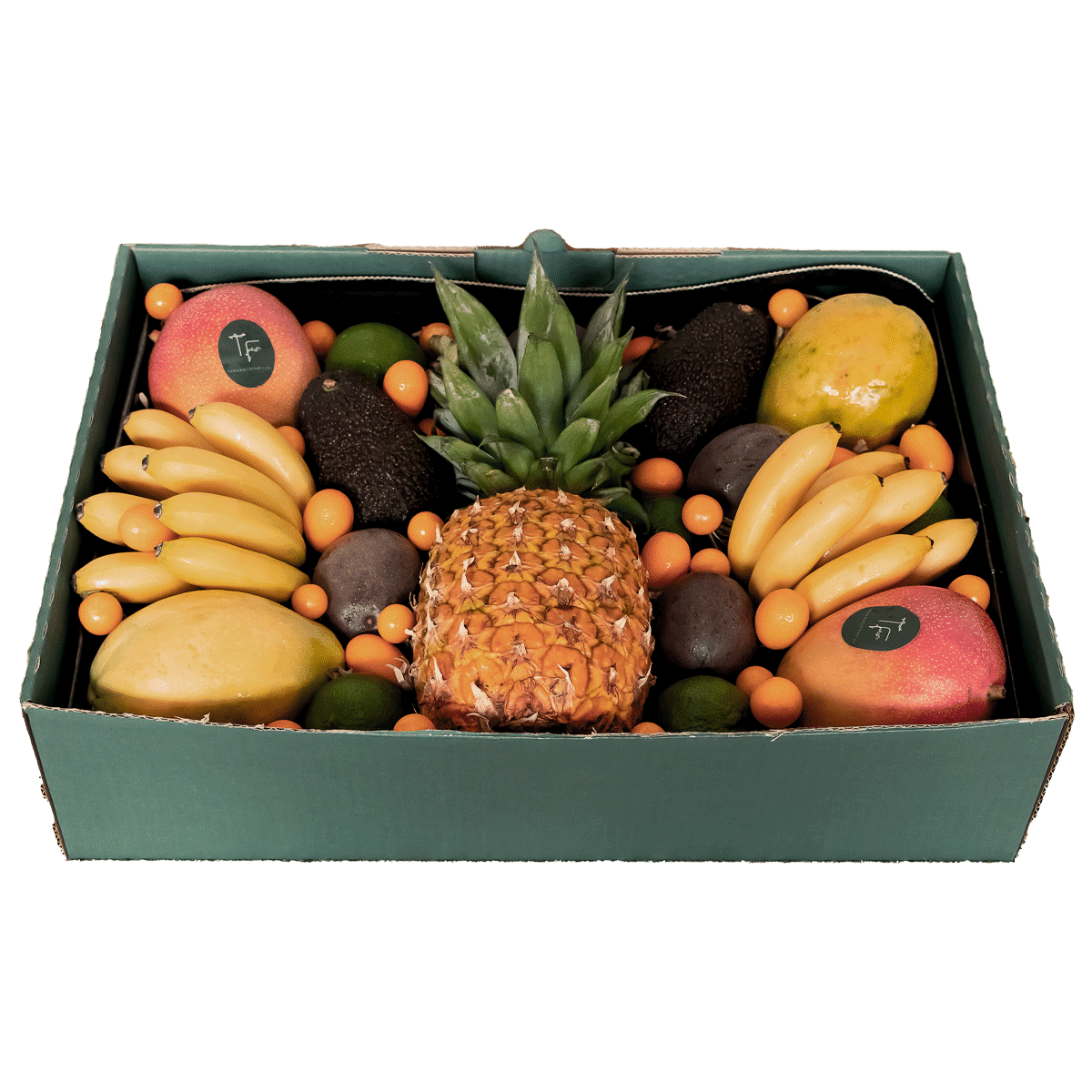The Exotic Box
Do you want to enjoy the best tropical fruits all year round, without the constraints and hazards of the supermarket? Look no further, Tendance Fruit has the solution and offers you the Exotic Box: let yourself be seduced by the unique and exotic flavours of our delicious exotic fruits, ripened to perfection and delivered directly to your home or office.
The box includes: 5kg of exotic fruits
CHF 70.00
Livraison offerte sur Vaud et Genève
Composition du panier :
Vous pouvez ajouter des produits supplémentaires à l’étape suivante.
Tous savoir sur les fruits de votre panier
Carte d'identité de l'Abricot
Pleine saison
Vitamines
Cultivé
Apport calorique
Conservation

Comment conserver un abricot?
L’abricot peut se conserver 2 à 3 jours à température ambiante et jusqu’à 5 jours au réfrigérateur. Pelé et coupé en morceaux, il se préserve mieux dans un contenant hermétique.
La composition de l’abricot (100g) :
Eau : 86 g
Lipides : 0,2 g
Glucides : 9,0 g
Protéines : 0,9 g
Vitamines : Bêta-carotène (provitamine A),C, E, B1,
B2, B3, B5, B6, B9
Potassium : 237,0 mg
Calcium : 15,6 mg
Magnésium : 8,7 mg
Carte d'identité de l'Ananas
L’ananas est un fruit exotique aux vertus nutritionnelles exceptionnelles. En effet, en plus de son parfum sucré caractéristique, l’ananas est riche en fibres, en minéraux et en antioxydants. Un combo gagnant pour un fruit juteux et gourmand à souhait !
Pleine saison
Vitamines
Cultivé
Apport calorique
Conservation
1 à 2 jours à température
ambiante et 4 à 5 j au réfrigérateur

Rien de tel qu’une petite touche exotique pour égayer une recette un peu classique.
Nature, flambé ou rôti, avec sa pulpe douce, sucrée et légèrement croquante, l’ananas est l’allié parfait pour des créations originales.
Comment conserver un ananas ?
L’ananas peut se conserver 2 à 3 jours à température ambiante et jusqu’à 5 jours au réfrigérateur. Pelé et coupé en morceaux, il se préserve mieux dans un contenant hermétique.
La composition de l’ananas (100g) :
Eau : 86 g
Lipides : 0,2 g
Glucides : 11,0 g
Protéines : 0,4 g
Vitamines : C, B1, B2, B3, B5, B6, B9
Potassium : 170,0 mg
Calcium : 20,3 mg
Magnésium : 19,8 mg
Carte d'identité de l'Avocat

Très prisé pour sa chair tendre et son goût unique, l’avocat est un fruit à la douceur singulière et aux propriétés antioxydantes reconnues.
Pleine saison
Vitamines
Cultivé
Mexique et
Amérique centrale
Apport calorique
Conservation

Comment conserver un avocat ?
L’avocat peut se conserver à l’air ambiant 3/4 jours et au réfrigérateur pendant 1 ou 2 jours maximum.
La composition de l'avocat (100g) :
Eau : 74 g
Lipides : 16,0 g
Glucides : < 3.13 g
Protéines : 1,8 g
Vitamines : C, E, B1, B2, B3, B5, B6, B9
Potassium : 412,0 mg
Calcium : 10,8 mg
Magnésium : 27,1 mg
Carte d'identité de la Banane
Avec son profil nutritionnel des plus complets et son goût inimitable, la banane est un fruit très apprécié des sportifs et des nutritionnistes. Sa saveur sucrée et sa texture douce en font le fruit le plus consommé dans le monde.
Pleine saison
Vitamines
Cultivé
Apport calorique
Conservation
1 à 2 jours à température
ambiante et 4 à 5 j au réfrigérateur

Pratique et savoureuse, la banane est une partenaire santé au quotidien. Plutôt consommée en version sucrée, elle accompagne aussi très bien des plats salés comme de la viande et des légumes grillés. Conseil : si vos bananes sont trop mûres, profitez-en pour en faire un smoothie frais ou un cake à la banane !
Comment conserver une banane ?
La banane est fragile et noircit au contact du froid, c’est pourquoi il est recommandé de la conserver à température ambiante. Au congélateur, retirez la peau et congelez-la entièrement, en morceaux ou en purée.
La composition de la banane (100g) :
Eau : 75 g
Lipides : 0,2 g
Glucides : 20,5 g
Protéines : 1,2 g
Vitamines : C, E, B1, B2, B3, B5, B6, B9
Potassium : 411,0 mg
Calcium : 4,5 mg
Magnésium : 32,8 mg
Carte d'identité du Citron Vert
Le citron vert, aussi appelé lime, est un fruit du limettier de la famille des Rutaceae.
Cet agrume aux reflets vifs est apprécié pour sa saveur légèrement épicée et sa fraîcheur caractéristique. Très prisé en cuisine salée comme sucrée (notamment orientale), on le savoure également dans toutes sortes de cocktails (mojito, caïpirinha, ti punch…) ou encore comme jus de « cuisson » dans des ceviches par exemple.
Pleine saison
Vitamines
Cultivé
Apport calorique
Conservation

À l'image de beaucoup d'autres agrumes, le citron vert est très concentré en vitamine C et permet donc de renforcer le système immunitaire et de favoriser l’absorption du fer. Un cocktail de fraîcheur et de vitamines qui renferme également des propriétés anti-inflammatoires et antipyrétiques, très efficaces pour prévenir les maladies chroniques saisonnières comme la grippe ou le rhume !
Comment conserver un citron vert ?
Plutôt résistant, le citron vert se conserve jusqu'à 15 jours dans le compartiment à légumes du réfrigérateur. Laissé à l'air libre, celui-ci se desséchera plus rapidement.
La composition du citron vert (100g) :
Eau : 88 g
Lipides : 0,2 g
Glucides : 2,8 g
Protéines : 0,7 g
Vitamines : C, E, B1, B5, B6, B9
Potassium : 102,0 mg
Calcium : 33,0 mg
Magnésium : 6,7 mg
Carte d'identité de la Clémentine
Issue d’un croisement entre une mandarine et une orange, la clémentine se distingue par son absence de pépins ainsi que par son goût acidulé, rafraîchissant et délicieusement sucré. Facilement transportable, on la glisse dans sa poche pour une pause gourmande, pratique et savoureuse. Parfaite pour un dessert, la clémentine se marie très bien avec le chocolat par exemple. Pour dynamiser une salade, on ajoute quelques tranches de clémentine avec de la burrata ainsi que des tomates cerises… Effet garanti !
Pleine saison
Vitamines
Cultivé
Apport calorique
Conservation
1 semaine à température
ambiante et 2 semaines au réfrigérateur

Comment conserver une clémentine?
Grâce à son écorce épaisse, la clémentine est un fruit plutôt résistant et se conserve jusqu’à une semaine à température ambiante et plus de 2 semaines dans le compartiment à légumes du réfrigérateur.
La composition de la clémentine (100g) :
Eau : 87 g
Lipides : 0,2 g
Glucides : 9,2 g
Protéines : 0,8 g
Vitamines : C, B1, B2, B5, B6, B9
Potassium : 154,0 mg
Calcium : 25,2 mg
Magnésium : 12,4 mg
Carte d'identité du Fruit de la Passion / Grenadille
Aussi appelé grenadille, le fruit de la passion est très apprécié pour sa chair parfumée et ses petites graines noires caractéristiques. Un goût d’évasion qui a aussi de nombreux bienfaits nutritionnels : riche en vitamine C et en fibres, on en consomme pour un coup de boost immédiat !
Pleine saison
Vitamines
Cultivé
Apport calorique
Conservation
1 à 2 jours à température
ambiante et 4 à 5 jours au réfrigérateur

Grâce au fruit de la passion, ajoutez de l’exotisme à vos cocktails, relevez vos préparations salées ou surprenez vos invités avec des desserts ultra-savoureux. Entremets, mousses ou encore glaces maison acidulées, le fruit de la passion n’a pas dit son dernier mot !
Comment conserver un fruit de la passion ?
Le fruit de la passion est plutôt résistant et se conserve bien. Laissez-le mûrir à température ambiante 2 à 3 jours, puis mettez-le au réfrigérateur où il se conservera une semaine.
La composition du fruit de la passion (100g) :
Eau : 73 g
Lipides : 0,7 g
Glucides : 9,5 g
Protéines : 2,2 g
Vitamines : C, B2, B3, B6, B9
Potassium : 348,0 mg
Calcium : 10,4 mg
Magnésium : 26,7 mg
Carte d'identité de la Grenade
Avec leur rouge vif et leur chair gorgée de soleil, les grenades sont de véritables bonbons acidulés ! On les aime pour leur saveur unique, leur légère acidité et leur fort pouvoir nutritionnel, car oui, la grenade est l'un des fruits ayant le plus de propriétés antioxydantes !
Pleine saison
Vitamines
Cultivé
Apport calorique
Conservation

Comment conserver la grenade ?
Les grenades peuvent être conservées 2 semaines à température ambiante et jusqu'à un mois dans le bac à légumes du réfrigérateur. À une température de 5 °C, vous pouvez les conserver jusqu'à quatre mois.
La composition de la grenade (100g) :
Eau : 81 g
Lipides : 0,6 g
Glucides : 13,6 g
Protéines : 1,1 g
Vitamines : C, E, B1, B2, B3, B5, B6, B9
Potassium : 262,0 mg
Calcium : 4,3 mg
Magnésium : 7,5 mg
Carte d'identité du Kaki
Fruit national du Japon, le kaki a conquis nos cœurs avec une saveur exotique et une chair fondante. Plein de ressources, ce fruit se déguste aussi bien directement à la petite cuillère que dans une salade de fruits frais, en pâtisserie, dans un crumble ou dans des entremets. Côté salé, il accompagne à merveille un assortiment de fromages ou un tajine de poulet par exemple.
Pleine saison
Vitamines
Cultivé
Apport calorique
Conservation
2 jours à température
ambiante puis 2 à 3 j au réfrigérateur

Comment conserver un Kaki ?
Le kaki se conserve jusqu'à 2 jours à l’air libre. Dès qu'il commence à être légèrement mou, transférerez-le dans le compartiment à légumes de votre réfrigérateur pour prolonger sa conservation de deux ou trois jours maximum.
La composition du kaki (100g) :
Eau : 81 g
Lipides : 0,3 g
Glucides : 13,7 g
Protéines : 0,6 g
Vitamines : C, E, B1, B2, B3, B6, B9
Potassium : 180,0 mg
Calcium : 11,3 mg
Magnésium : 10 mg
Carte d'identité du Kiwi
Pleine saison
Novembre à mai
Vitamines
C, E, B6, B9
Cultivé
Amérique du Sud
Apport calorique
60 Kcal pour 100g
Conservation
3 à 4 semaines dans un bac à légumes

Si le kiwi se consomme entier et cru, généralement au petit-déjeuner ou en dessert, ce fruit permet aussi la réalisation de recettes originales et gourmandes.
En effet, le goût sucré et acidulé du kiwi se marie délicieusement avec le sucré autant qu’avec le salé. Il fait des merveilles dans les salades de légumes et autres plats en sauce.
Comment conserver un kiwi ?
Les kiwis se conservent deux à trois semaines à température ambiante, selon leur degré de maturité initial.
Si vous les choisissez jeunes, à conserver de préférence dans une pièce fraîche entre 5°C et 10°C ou simplement dans le bac à légumes de votre réfrigérateur.
La composition du kiwi (100g) :
Eau : 84 g
Lipides : 0,7 g
Glucides : 9,4 g
Protéines : 1,1 g
Vitamines : C, E, B6, B9
Potassium : 270,0 mg
Calcium : 26,6 mg
Magnésium : 12,2 mg
Carte d'identité du Kumquat
Originaire de Chine, le kumquat est un petit agrume à la pulpe acidulée et au cœur délicieusement juteux. Véritable concentré de vitamines, on le déguste au naturel directement avec la peau !
Pleine saison
Vitamines
Cultivé
Apport calorique
Conservation

Comment conserver un kumquat?
Le kumquat se conservera mieux à température ambiante, à l'abri de l'humidité et de la chaleur.
La composition du kumquat (100g) :
Eau : 80,8 g
Lipides : 0,9 g
Glucides : 15,9 g
Protéines : 1,9 g
Vitamines : B3, C
Potassium : 186,0 mg
Calcium : 62,0 mg
Magnésium : 20,0 mg
Carte d'identité du Litchi
Pleine saison
Vitamines
Cultivé
Apport calorique
Conservation

Comment conserver un litchi ?
Plutôt fragile, le litchi est à conserver à température ambiante et à consommer dans les 48 heures sinon ils ont tendance à fermenter. Au réfrigérateur, il se conserve jusqu’à 10 jours.
La composition du litchi (100g) :
Eau : 82 g
Lipides : 0,4 g
Glucides : 14,0 g
Protéines : 0,8 g
Vitamines : C, B2, B3, B6, B9
Potassium : 171,0 mg
Calcium : 5,0 mg
Magnésium : 10,0 mg
Carte d'identité de la Mandarine
Moins acide et plus sucrée que la plupart des autres agrumes, la mandarine offre une saveur très parfumée, souvent utilisée en cuisine. Encas sain et gourmand, on la déguste nature, en dessert ou dans des préparations salées plus audacieuses comme des mandarines rôties au chèvre et au thym. Un vrai délice !
Pleine saison
Vitamine
Cultivé
Apport calorique
47,3 Kcal pour 100g
Conservation
1 semaine à température ambiante et plus de 2 semaines au réfrigérateur

Comment conserver une mandarine ?
La mandarine est plutôt résistante et peut se conserver une semaine à température ambiante puis plus de 2 semaines dans le compartiment à légume du réfrigérateur.
La composition de la mandarine (100g) :
Eau : 85,2 g
Lipides : 0,3 g
Glucides : 13,3 g
Protéines : 0,8 g
Vitamines : B3, B5, C, E
Potassium : 166,0 mg
Calcium : 37,0 mg
Magnésium : 12,0 mg
Carte d'identité de la Mangue
Populaire et très juteuse, la mangue est un fruit tropical dont on raffole pour ses grandes propriétés nutritionnelles et pour son goût sucré et parfumé. Riche en polyphénols, elle protège les cellules du corps contre les dommages liés aux radicaux libres.
Pleine saison
Vitamines
Cultivé
Apport calorique
Conservation

Comment conserver une mangue ?
La mangue doit-être conservée à température ambiante et au réfrigérateur une fois coupée.
La composition de la mangue (100g) :
Eau : 83 g
Lipides : 0,2 g
Glucides : 13,6 g
Protéines : 0,7 g
Vitamines : C, E, B1, B2, B3, B5, B6, B9
Potassium : 180,0 mg
Calcium : 12,0 mg
Magnésium : 13,0 mg
Carte d'identité du Mini Ananas
Le mini ananas est un fruit exotique aux vertus nutritionnelles exceptionnelles. En effet, en plus de son parfum sucré caractéristique, il est riche en fibres, en minéraux et en antioxydants. Un combo gagnant pour un fruit juteux et gourmand à souhait !
Pleine saison
Vitamines
Cultivé
Apport calorique
Conservation
1 à 2 jours à température
ambiante et 4 à 5 jours au réfrigérateur

Rien de tel qu’une petite touche exotique pour égayer une recette un peu classique.
Nature, flambé ou rôti, avec sa pulpe douce, sucrée et légèrement croquante, le mini ananas est l’allié parfait pour des créations originales.
Comment conserver un mini ananas ?
Le mini ananas peut se conserver 2 à 3 jours à température ambiante et jusqu’à 5 jours au réfrigérateur. Pelé et coupé en morceaux, il se préserve mieux dans un contenant hermétique.
La composition du mini ananas (100g) :
Eau : 86 g
Lipides : 0,2 g
Glucides : 11,0 g
Protéines : 0,4 g
Vitamines : C, E, B1, B2, B3, B5, B6, B9
Potassium : 170,0 mg
Calcium : 20,3 mg
Magnésium : 19,8 mg
Carte d'identité de la Mini Banane
Avec sa peau fine et sa chair ferme, la mini banane est très appréciée dans la réalisation de dessert pour son goût très sucré. Aussi appelée banane « Fressinette », ce fruit de petite taille est parfait pour un en-cas savoureux et riche en vitamines.
Pleine saison
Vitamines
Cultivé
Apport calorique
Conservation

Comment conserver une mini banane ?
La mini banane est particulièrement fragile, c’est pourquoi il ne faut pas la mettre au réfrigérateur, ni dans un endroit trop chaud pour éviter qu’elle ne noircisse.
Conservez vos mini bananes dans un endroit frais et sec.
La composition d’une mini banane (100gr) :
Eau : 75 g
Lipides : 0,2 g
Glucides : 20,5 g
Protéines : 1,2 g
Vitamines : C, E, B1, B2, B3, B5, B6, B9
Potassium : 411,0 mg
Calcium : 4,5 mg
Magnésium : 32,8 mg
Carte d'identité de la Nectarine
Avec sa peau lisse et brillante, la nectarine est issue d’une variété de la pêche.
Blanche ou jaune, elle est désaltérante et son goût sucré et très acidulé en fait une partenaire gourmande du quotidien. On la consomme plus souvent crue, mais elle aussi délicieuse cuite en desserts, en compotes, et même grillée dans des salades vitaminées !
Pleine saison
Vitamines
Cultivé
Apport calorique
Conservation

En plus d'être ultra goûteuse et très rafraîchissante, la nectarine est un fruit diurétique qui favorise l'élimination des toxines de l’organisme. Sa teneur en fibres permet également d’améliorer le transit intestinal et aide à garder la ligne !
Comment conserver une nectarine ?
La nectarine se conserve deux à trois jours à température ambiante.
Évitez au maximum de la placer au réfrigérateur (sauf en cas de grosse chaleur) au risque d’en altérer la saveur.
La composition de la nectarine (100g) :
Eau : 88 g
Lipides : 0,1 g
Glucides : 7,7 g
Protéines : 1,4 g
Vitamines : C, E, B1, B2, B3, B5, B6, B9
Potassium : 168,0 mg
Calcium : 4,9 mg
Magnésium : 9,1 mg
Carte d'identité de l'Orange
Star parmi les stars, l’orange est un agrume très populaire au goût sucré et légèrement acidulé qui se consomme au quotidien. Crue, cuite ou même confite, l’orange accompagne de nombreuses recettes. Couramment consommée en jus frais, elle est aussi parfaite en sorbet, dans des pâtisseries ou encore dans des cocktails (avec ou sans alcool).
Le saviez-vous ? Son jus acidulé peut remplacer le vinaigre dans certaines salades.
Pleine saison
Vitamines
Cultivé
Europe, Asie
Apport calorique
Conservation

Sa chair juteuse regorge de bienfaits… On l’apprécie tout d’abord pour sa forte concentration en vitamine C, idéale pour faire le plein d’énergie et de vitalité, mais aussi pour ses propriétés antioxydantes et anti-inflammatoires. L’orange est également une puissante alliée dans la lutte contre les maladies cardiovasculaires ou encore le diabète.
Comment conserver l’orange ?
Par chance, l’orange est un fruit plutôt simple à conserver. Vous pouvez ainsi la garder jusqu’à une semaine à température ambiante et jusqu'à deux semaines dans le compartiment à légumes du réfrigérateur.
La composition de l'orange (100g) :
Eau : 87 g
Lipides : 0,3 g
Glucides : 8,3 g
Protéines : 1,0 g
Vitamines : C, E, B1, B2, B3, B5, B6, B9
Potassium : 151,0 mg
Calcium : 39,0 mg
Magnésium : 12,4 mg
Carte d'identité du Pamplemousse
Le pamplemousse est un agrume subtropical à la saveur amère et acidulée unique et à la chair pulpeuse caractéristique. Avec son arôme particulier, il est très apprécié en jus, en salade de fruits frais ou encore mélanger à de l’avocat pour des compositions fraiches et savoureuses.
Pleine saison
Novembre à janvier et de juillet à août
Vitamines
C, E, B1, B2,
B3, B5, B6, B9
Cultivé
Asie, Amérique Latine, Amérique Centrale
Apport calorique
Conservation
1 semaine à température ambiante et 6 semaines au réfrigérateur

Comment conserver un pamplemousse ?
Plutôt résistant, le pamplemousse se conserve une semaine à température ambiante et jusqu’à presque six semaines au réfrigérateur.
La composition du pamplemousse (100g) :
Eau : 90 g
Lipides : 0,1 g
Glucides : 6,2 g
Protéines : 0,8 g
Vitamines : C, E, B1, B2, B3, B5, B6, B9
Potassium : 167,0 mg
Calcium : 23,3 mg
Magnésium : 9,2 mg
Carte d'identité de la Papaye
Avec sa chair subtilement sucrée et ses petites graines noires, la papaye est un fruit tropical appartenant à la famille des Cariaceae. Issue de l’arbre du papayer, on l’apprécie notamment pour ses vertus antioxydantes. Connue en Europe depuis quatre siècles, la papaye reste un fruit exotique dépaysant très apprécié des gourmets !
Pleine saison
Vitamines
Cultivé
Apport calorique
Conservation
2 à 5 jours à température
ambiante et 5 à 7 j au réfrigérateur

Délicatement parfumée, la papaye est un fruit tropical qui se déguste cru ou cuit.
Sa saveur particulière permet de créer des recettes originales, sucrées-salées. Riche en vitamines et minéraux, elle se prépare en quelques minutes et délivre un goût unique.
Comment conserver la papaye ?
Si la papaye n’est pas parfaitement mûre, gardez-la à température ambiante jusqu’à pleine maturité, puis placez-la au réfrigérateur où elle se conservera quelques jours.
La composition de la papaye (100g) :
Eau : 88 g
Lipides : 0,2 g
Glucides : 7,8 g
Protéines : 0,6 g
Vitamines : C, E, B9
Potassium : 193,0 mg
Calcium : 22,5 mg
Magnésium : 33,0 mg
Carte d'identité de la Pêche
Une peau veloutée, une saveur sucrée, rafraîchissante et délicieusement juteuse, la pêche a tout bon ! Ce fruit très populaire possède de nombreuses variétés et se déguste à n’importe quel moment de la journée pour une pause saine et gourmande. Sur le pouce, dans un smoothie ou même dans une salade salée pour une touche estivale, la pêche séduit toujours autant.
Pleine saison
Vitamines
Cultivé
Apport calorique
Conservation
2 à 3 jours à température
ambiante

Comment conserver une pêche ?
À conserver deux à trois jours à température ambiante. Évitez de la conserver au réfrigérateur, car un froid trop vif peut altérer sa saveur. Pour une conservation très longue, vous pouvez aussi la congeler.
La composition de la pêche (100g) :
Eau : 85 g
Lipides : 0,3 g
Glucides : 10,2 g
Protéines : 0,9 g
Vitamines : C, E, B1, B2, B3, B5, B6, B9
Potassium : 215,0 mg
Calcium : 7,3 mg
Magnésium : 11,2 mg
Carte d'identité du Physalis
Le physalis, aussi appelé « amour en cage », est une plante issue de la famille des solanacées. Très sucré, ce petit fruit délicat et savoureux a également de nombreux bienfaits sur l’organisme.
Pleine saison
automne, hiver
Vitamines
Cultivé
France et Asie de l’est
Apport calorique
68,6 Kcal pour 100g
Conservation
1 à 2 jours à température
ambiante et 4 à 5 jours au réfrigérateur

Avec sa belle teinte jaune doré, le physalis est à déguster nature pour un en-cas journalier, mais aussi poêlé, en compote, en confiture… Il accompagne et relève avec beaucoup de finesse vos préparations culinaires.
Comment conserver un physalis ?
Ce fruit peut se conserver de nombreuses semaines au frais, à la condition que son enveloppe soit intacte.
La composition du physalis (100g) :
Eau : 85,4 g
Lipides : 0.4 g
Glucides : 7.9 g
Protéines : 1.1 g
Vitamines : B1, B3, C
Potassium : 0,0 mg
Calcium : 9,0 mg
Magnésium : 0,0 mg
Carte d'identité de la Poire
Reine des desserts, la poire peut se déguster crue ou cuite et se transforme en mets délicat lorsqu'elle est cuisinée. Avec sa chair fondante et savoureuse, on la consomme nature, en jus, en compote ou encore dans des cocktails. Saine et gourmande, la poire n’est pas en reste lorsqu’il s’agit de nous régaler !
Pleine saison
Vitamines
Cultivé
Apport calorique
Conservation

Avec son goût sucré prononcé et sa fraîcheur caractéristique, la poire est aussi un atout côté nutrition, bien-être et santé. En effet, ces fruits agissent directement sur la digestion grâce à leur teneur riche en fibre et à la présence naturelle d’antioxydants jouant un rôle important dans la prévention de certains cancers.
Comment conserver une poire ?
La poire étant un fruit qui mûrit plutôt vite, ne tardez pas à la consommer (dans les 48h maximum). Et si votre poire n’est pas mûre, laissez-la à température ambiante 2 jours avant de la déguster.
La composition de la poire (100g) :
Eau : 85 g
Lipides : 0,2 g
Glucides : 10,8 g
Protéines : 0,4 g
Vitamines : C, E, B1, B2, B5, B6, B9
Potassium : 130,0 mg
Calcium : 7,4 mg
Magnésium : 7,8 mg
Carte d'identité de la Poire Nashi
Pleine saison
Vitamines
Cultivé
Apport calorique
Conservation
2 à 3 jours à température
ambiante et 5 j au réfrigérateur

Comment conserver la poire nashi ?
La poire nashi est un fruit plutôt fragile et doit être consommé rapidement.
Elle se conserve 2 à 3 jours à température ambiante et jusqu’à 5 jours dans le compartiment à légumes du réfrigérateur.
La composition de la poire nashi (100g) :
Eau : 88,3 g
Lipides : 0,2 g
Glucides : 10,7 g
Protéines : 0,5 g
Vitamines : C, B3
Potassium : 121,0 mg
Calcium : 4,0 mg
Magnésium : 8,0 mg
Carte d'identité de la Pomme
Appréciée par tous et parfaite pour des en-cas pleins de vitamines ou des desserts signatures, la pomme a la particularité de se consommer aisément crue ou cuite, sucrée ou salée. Riche en vitamines et en eau, ce fruit sain et savoureux se glisse facilement dans la poche pour notre plus grand plaisir !
Pleine saison
Vitamines
Cultivé
Apport calorique
Conservation
3 j au réfrigérateur

Avec sa texture ferme et croquante, son gout sucré et légèrement acidulé, il existe près de 1000 variétés de pommes ! Facile à déguster, gourmande mais aussi très saine, la pomme possède de grandes propriétés anti-oxydantes et sa forte concentration en pectine permet de faire baisser le taux de cholestérol dans le sang et apporte une bonne dose de vitamine C. Naturelle, en jus, en tarte ou en compote… Quelle sera votre façon de la déguster ?
Comment conserver une pomme ?
Comme la plupart des fruits, les pommes nécessitent une conservation à température ambiante au risque de perdre une partie de leur saveur. Elles peuvent se conserver jusqu’à 3 jours dans le compartiment à légumes du réfrigérateur ou vous pouvez aussi faire le choix de les déshydrater pour une conservation longue durée.
La composition de la pomme (100g) :
Eau : 85 g
Lipides : 0,2 g
Glucides : 11,3 g
Protéines : 0,3 g
Vitamines : C, E, B1, B2, B5, B6, B9
Potassium : 120,0 mg
Calcium : 5,1 mg
Magnésium : 6,1 mg
Carte d'identité de la Prune
Ce fruit délicat à la peau lisse et au cœur acidulé possède plusieurs variétés. De la Reine-Claude à la quetsche en passant par la mirabelle, elles sont bien souvent les reines des tartes estivales ou encore des compotes gourmandes. La prune a plus d’un tour dans son sac et accompagne aussi très bien un plateau de fromages et charcuterie, et même un curry de crevettes ! Alors, fraîche, cuite, en jus ou séchée, faites parler votre imagination et surprenez vos convives avec ce petit fruit qui a tout pour lui.
Pleine saison
Vitamines
Cultivé
Apport calorique
Conservation
Quelques jours à température
ambiante et 1 semaine au réfrigérateur

Comment conserver la prune ?
À conserver quelques jours à température ambiante et jusqu’à une semaine au réfrigérateur. Il est aussi possible de la congeler pour en profiter toute l’année.
La composition de la prune (100g) :
Eau : 87,2 g
Lipides : 0,3 g
Glucides : 11,4 g
Protéines : 0,7 g
Vitamines : B3, C, E
Potassium : 157,0 mg
Calcium : 6,0 mg
Magnésium : 7,0 mg
Carte d'identité du Pruneau
Le pruneau est le fruit d'une variété de pruniers. Très apprécié pour sa chair tendre et charnue qui apporte douceur et saveur aux plats salés comme sucrés, ce fruit se consomme aussi tout au long de la journée.
Pleine saison
Vitamines
Cultivé
Apport calorique
Conservation
Plusieurs jours à température
ambiante ou au réfrigérateur

Particulièrement recommandé par les nutritionnistes, ce fruit possède de multiples vertus pour l’organisme. Connu pour ses bienfaits sur le transit intestinal et en tant qu’allié minceur, il est aussi excellent dans la lutte contre les maladies cardio-vasculaires et inflammatoires. Il est conseillé de consommer 3 à 4 pruneaux par jour lors de baisse d’énergie et de coups de fatigues soudain ou lors d’une cure détoxifiante.
Comment conserver un pruneau ?
Peu fragile, le pruneau se conserve très bien à température ambiante. Pour préserver son moelleux, vous pouvez les conserver (dans une boîte étanche) au réfrigérateur quelques jours.
La composition du pruneau (100g) :
Eau : 33 g
Lipides : 0,7 g
Glucides : 52,3 g
Protéines : 2,4 g
Vitamines : C, E, B1, B2, B3, B5, B6, B9
Potassium : 657,0 mg
Calcium : 47,9 mg
Magnésium : 33,7 mg
Carte d'identité du Raisin
Le raisin est l’un des fruits les plus cultivés au monde et ses variétés sont nombreuses.
Qu'il soit jaune, vert, rouge ou noir, son goût sucré, caractéristique et gorgé de soleil est une parfaite façon de prolonger les beaux jours. Rafraîchissant, car riche en eau et légèrement croquant, on déguste les grains de raisin au naturel, mais également dans des plats orientaux comme le tajine ou le couscous, ou encore en accompagnement de mets raffinés comme du foie gras.
Pleine saison
Vitamines
Cultivé
Apport calorique
Conservation
3 à 5 jours à température
ambiante et 1 semaine au réfrigérateur

Le raisin nous veut du bien ! Grande source de fibres et très riche en vitamines et minéraux, consommer du raisin régulièrement favorise la prévention des maladies cardiovasculaires : notamment grâce au réservatol, un puissant antioxydant présent naturellement dans ce fruit qui réduit aussi les risques d'apparition de cancers.
Comment conserver le raisin ?
Le raisin se conserve 3 à 5 jours à température ambiante puis jusqu’à une semaine si vous le disposez au réfrigérateur sur du papier absorbant (cela le protégera de l’humidité). Un conseil : sortez-le au moins 1 heure à l’avance pour qu'il retrouve tout son arôme.
La composition du raisin (100g) :
Eau : 82 g
Lipides : 0,2 g
Glucides : 16,1 g
Protéines : 0,6 g
Vitamines : C, E, B1, B2, B3, B5, B6, B9
Potassium : 212,0 mg
Calcium : 10,1 mg
Magnésium : 10,3 mg
Vous pourriez aussi aimer





